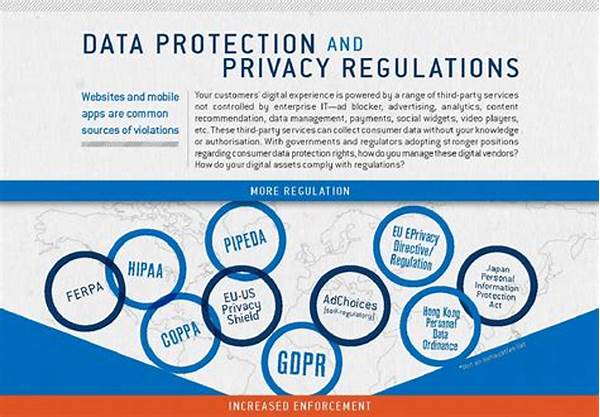In the fast-paced world of Artificial Intelligence (AI), innovation knows no bounds. However, ensuring the protection of personal data in an era dominated by AI is of paramount importance. As AI systems become more powerful and prevalent, data protection laws are being scrutinized, revised, and enforced more than ever. Compliance with AI data protection laws is not just a legal obligation but a commitment to ethical standards and a method to build trust with users. The evolution of AI calls for a balance between technological advancement and individual privacy rights—a challenge that requires businesses to re-evaluate their practices continuously.
Let’s paint a picture: Imagine a bustling metropolis where autonomous vehicles zip through the streets. Behind the scenes, these vehicles are collecting immense amounts of data—road conditions, pedestrian movements, and even the routes you frequently travel. This data, while instrumental for the innovation and safety of autonomous cars, can be dangerously intrusive if not handled correctly. Enter data protection laws, standing as gatekeepers to prevent misuse, ensuring that while technology evolves, privacy rights remain unscathed.
Compliance with AI data protection laws is paramount. Organizations need to familiarize themselves with regulations such as the General Data Protection Regulation (GDPR) in Europe, or the California Consumer Privacy Act (CCPA) in the United States, which set the stage for data protection measures globally. These laws mandate transparency, user consent, and accountability—essentials that make AI systems trustworthy and responsible. For businesses, failure to adhere to these laws can not only result in severe penalties but can also damage their reputations beyond repair.
Adapting to Data Protection Changes
Businesses that strive for compliance with AI data protection laws often find themselves at a crossroads. Innovation thrives on data; therefore, achieving compliance without stifling progress can be challenging. Companies must invest in dedicated data protection officers or teams. These specialists are charged with the formidable task of ensuring that AI systems are designed and operated following legal standards. It’s a balancing act between fostering innovation, meeting market demands, and maintaining respect for user privacy.
Moreover, the journey towards compliance with AI data protection laws involves state-of-the-art protective measures. Encryption, anonymization, and regular audits are some of the technical solutions that organizations need to incorporate. Beyond the technical, fostering a corporate culture of privacy where every employee understands the importance of data protection can set a company apart in the digital realm. Innovative ideas only reach their full potential when they are supported by responsible and ethical practices.
The Role of Technology in Ensuring Compliance
The technological landscape itself provides solutions for compliance with AI data protection laws. Sophisticated software can autonomously ensure data minimization, while machine learning algorithms can monitor data usage to flag potential breaches. Companies leveraging AI must incorporate automation and machine learning technologies that are dedicated exclusively to safeguarding data. Thus, technology is not just part of the problem; it is also a significant part of the solution in managing privacy concerns and complying with the law.
Key Elements of Compliance with AI Data Protection Laws
Understanding and implementing these elements pave the way for successful compliance with AI data protection laws. Through this educational journey, organizations not only adhere to legal requirements but also gain the trust and confidence of their users.
—
Understanding AI and Data Protection
The meteoric rise of AI has revolutionized industries, from healthcare to retail, transforming how companies operate and compete. Yet, this transformation raises critical concerns about data privacy. Compliance with AI data protection laws becomes crucial, as the data feeding AI systems could potentially expose sensitive personal information. The intricate tapestry of AI algorithms requires a robust framework ensuring ethical usage, transparency, and consent. Organizations must navigate this complex landscape, aiming not only at innovation but also at rebuilding and maintaining consumer trust.
In recent years, high-profile data breaches and mishaps have catapulted data protection into the public eye. People are more aware and concerned about how their data is used, pushing for stringent privacy laws worldwide. The challenge for industries today is twofold: how to harness the power of AI without compromising user privacy, and how to stay compliant with evolving legal demands. This dual ambition shapes a transformative journey, where companies write the narrative of responsible AI use, reassured by guidelines that protect individual rights.
Understanding that compliance with AI data protection laws is not just ticking boxes, but is integral to ethical business conduct, is critical. This understanding springs from a genuine commitment at all organizational levels to transparency, security, and respect for user data. As we venture deeper into the AI-driven future, compliance’s role grows more profound, signaling a shift toward a more accountable technological landscape.
—
Navigating the Legal Requirements
As companies dive deeper into AI integration, comprehending and navigating the myriad legal requirements for data protection have become business imperatives. Legal compliance isn’t a deterrent to innovation—it’s the keystone that allows ethical progress. By embedding compliance into the foundation of AI systems, companies can foster an environment where innovation thrives alongside unwavering user trust.

